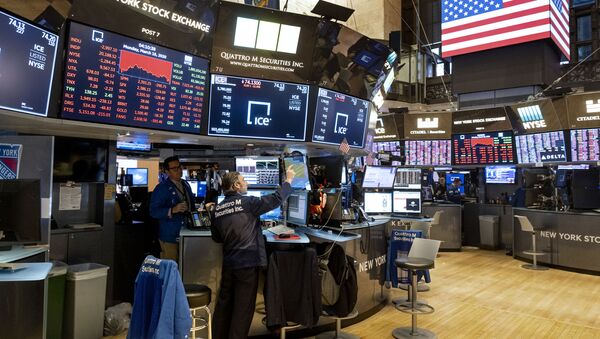At closing, the DJIA traded 1,048.79 points in the green as the S&P 500 saw gains of 143.06 points. The Nasdaq Composite, which plunged into red territory earlier in the day, finished the day’s trading at an increase of 430.19 points.
The positive figures come hours after US President Donald Trump held a briefing at the White House with members of the coronavirus task force. During the briefing Trump appeared hopeful for the future, telling reporters and viewers alike that the US economy would “pop” after the crisis and make positive rebounds.
"We're going to win, and I think we're going to win faster than people think, I hope," Trump, surrounded by his top advisers on the coronavirus crisis, said while also urging Americans to follow guidelines released by the administration the day prior.
At present, the data collected by the Johns Hopkins University Center for Systems Science and Engineering indicates that in the US more than 5,700 people have been diagnosed with the COVID-19 virus and that more than 90 have died as a result. Globally, over 190,000 individuals have contracted the virus.
US Treasury Secretary Steven Mnuchin briefly appeared alongside Trump during the presser and noted that he was discussing measures with congressional leaders that would allow officials to provide emergency funds “immediately” to Americans.
“Americans need cash now,” Mnuchin said before stating that checks could be disbursed sometime in the next two weeks, should discussions progress. “The president has instructed me that we have to do this now.”
US Markets Will Stay Open
With talk of US financial markets closing for the time being, Mnuchin prior to leaving the White House briefing stressed that Wall Street would remain open - even if it means reducing working hours at a later time.
“Everybody wants to keep it open,” the secretary said. “We may get to a point where we shorten the hours if that’s something they need to do, but Americans should know we are going to do everything to make sure that they have access to the money in their banks, to the money in their 401(k)s and to money in the stocks.”
Mnuchin’s remarks came a day after the NYSE set the record for its worst one-day point drop for the third time in recent weeks after the DJIA index fell by nearly 3,000 points moments after Trump stated Monday that the COVID-19 pandemic could last until July or August in the US.
The secretary further stated that additional measures are being considered, including allowing individuals to defer tax payments of up to $1 million to the Internal Revenue Service (IRS) and corporations to defer up to $10 million. Mnuchin also stated that Trump had already authorized the deferral of some $300 billion in IRS payments.
Federal Reserve Financial Assistance
Although the White House is attempting to put together a stimulus package worth up to $850 billion, the Federal Reserve, the US’ central bank, announced Tuesday that it would be creating a special credit facility to help businesses get up to $1 trillion in short-term funding.
The measure, allowed under the emergency 13 (3) powers of the Federal Reserve Act, will ultimately allow companies to obtain short-term funding to keep operations going amid the novel coronavirus outbreak. The program was previously used during the 2008 financial crisis.
“This is a crucial market for basically short-term borrowing by companies, and if you don’t get this short-term borrowing, you can’t get payments out, you can’t pay your employees, you can’t pay your customers,” Randall Kroszner, a former Fed governor, told CNBC. “If this freezes up, it’s a real problem.”
According to the New York Times, the latest financial measure, which benefits both financial firms and businesses, sees the Fed “buy unsecured and asset-backed commercial paper from eligible companies.”
The Fed’s move comes after the central bank announced late Sunday that it would be slashing its interest rates to near zero, among other financial salves that included at least $700 billion in government and mortgage-backed securities.



